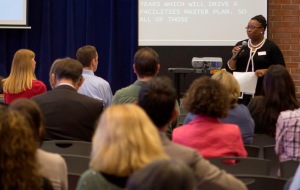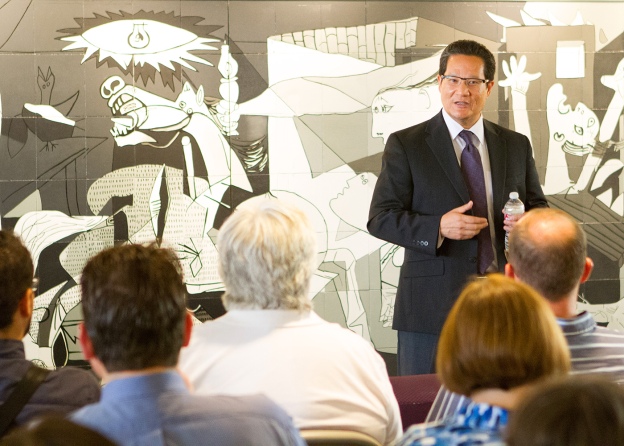I often compare Pima Community College to an airplane that is being built while it is flying. Nowhere is that metaphor more apt than in our planning processes. PCC must constantly monitor its current operations and make adjustments quickly and decisively, while continually checking for storms and breaks in the clouds far out on the horizon.
In my first six months as Chancellor, the College has done an excellent job mapping out a response to the major challenge directly in its path, probation. From April 16, when our accrediting organization, the Higher Learning Commission, issued the sanction, the College’s response has been vigorous and comprehensive. The work of Provost’s Office, charged by then-Interim Chancellor Dr. Zelema Harris to take the lead in restoring the confidence of the HLC and the public, speaks for itself:
- Successful submission to the HLC of a Monitoring Report on complaints and grievances, and faculty oversight of curriculum.
- Creation of committees composed of some 300 people, including faculty, students, staff and community members, to conduct an Institutional Self-Study, a top-to-bottom review of policies and operations.
- An evidence-based examination of 125 areas, which revealed PCC meets HLC criteria at either a high or acceptable level in 106 areas (about 85 percent).
- Quickly pulling together teams to bring the College into compliance no later than May 1, 2014 in the 19 areas where we do not currently meet criteria.
Thanks to the College’s focused, sophisticated plan, I’m confident we will successfully emerge from probation in early 2015. But as that work continues we must simultaneously set our sights on achieving other goals on more distant horizons that are three, four, five years out. In addition to making probation-related improvements, we need to identify external issues and opportunities. It should be noted that the HLC identified the College’s lack of systematic, integrated planning as a concern. But the reality is that the College, like any large, dynamic organization, should make strategic planning a top priority; in the 21st century, as globalization and advances in technology accelerate change in higher education, the need to think about the future becomes a necessity, as does creating a plan that, if properly implemented, can yield measurable benefits to the community as well as to our students.
Our process will begin with information gathering. In the coming weeks, the College will gather reliable, sophisticated data on the economic, political and sociocultural landscape at the local, regional and national level. The information will augment an Environmental Scan update conducted by the College’s Planning and Institutional Research office in the summer of 2013. The Arizona Hispanic Chamber of Commerce’s2013 report on our city’s Hispanic residents is an example of good data. The report’s findings regarding education, such as the fact that nearly 152,000 Hispanic students attend K-12 schools in Pima County, will help provide context for future planning, as will a presentation later this month by the Arizona Commerce Authority on workforce development.
The process also will include examining the strategic plans of a wide range of organizations, from the American Association of Community Colleges to the voter-approved Plan Tucson to The University of Arizona’s Never Settle. We will look for areas of mutual interest and opportunities to maximize our impact. I’m acutely aware that aligning the College with like-minded entities is crucial to effect meaningful change for students and the community – we can’t go it alone.
In a similar vein, I will ask our presidents to solicit input from their campuses, so that the best ideas can bubble up from where the essential work of teaching and learning occurs every day.
We will keep the College’s internal and external constituents informed throughout the process, and whenever we can, obtain feedback. And all of these ideas must be aligned with ongoing 2014-15 budget building, capital purchases and facilities maintenance, as well as information technology, human resources and public information issues, the Institutional Self-Study process, employee group concerns and Governing Board priorities. As I’ve said, building a plane while flying it.
From this complex synthesis will emerge 18-20 trends that will serve as the basis for a collaborative discussion by 150-200 internal and external thought leaders and stakeholders. We intend to invite these folks to the PCC Futures Conference in the latter half of February. At the one-day meeting, the invitees will break off into facilitated, small-group sessions whose charge will be to pare down and distill those 18-20 trends into four or five major initiatives that PCC can convert into a framework of well-defined goals and measurable actions. Our goal is to announce the strategic plan in the late spring.
It is at this point the airplane metaphor ceases to apply. All flights land, eventually. But the process we are initiating will be ongoing. We are cognizant that external events and new trends likely will prompt changes to our plans. We will reconvene the Futures Conference in 2015, when new information will be factored in and our course will be readjusted. The result will be the building of a collaborative culture of constant self-improvement. The hope is that, in always seeking to do things better in the future, Pima Community College will be able to reach new heights in its service to its students and the community.


